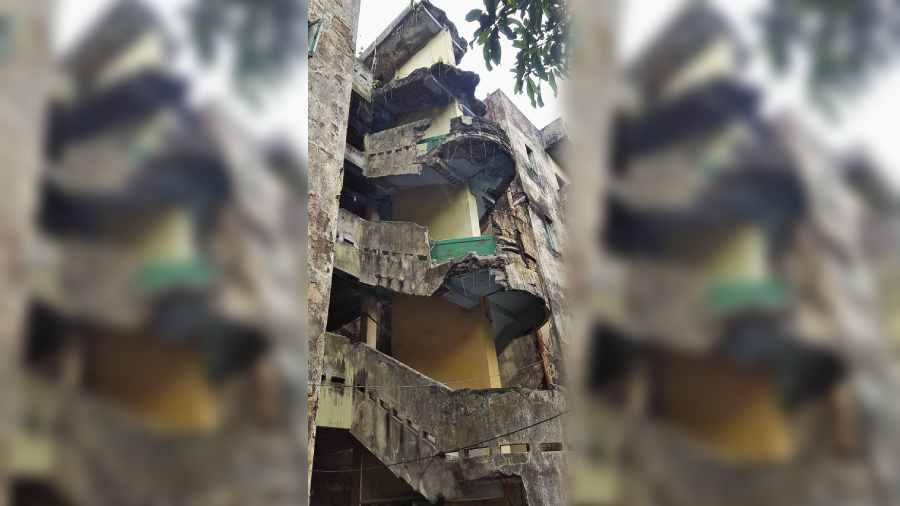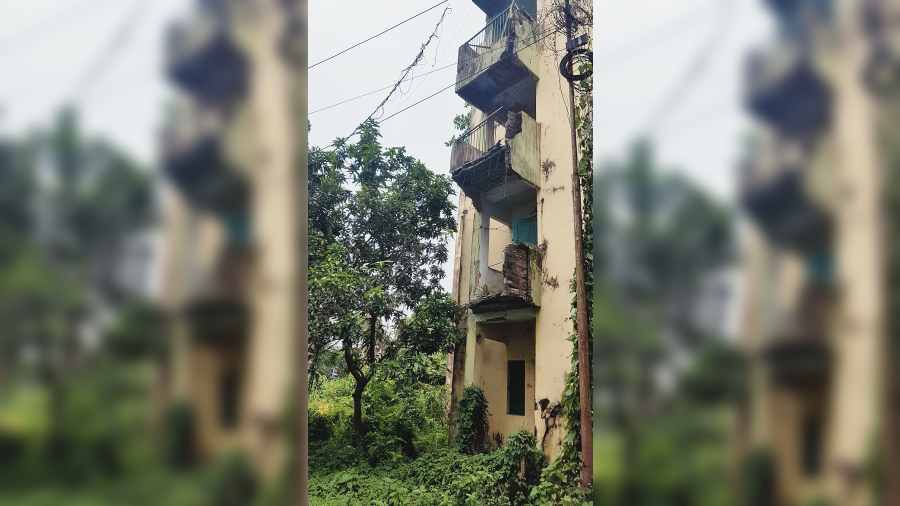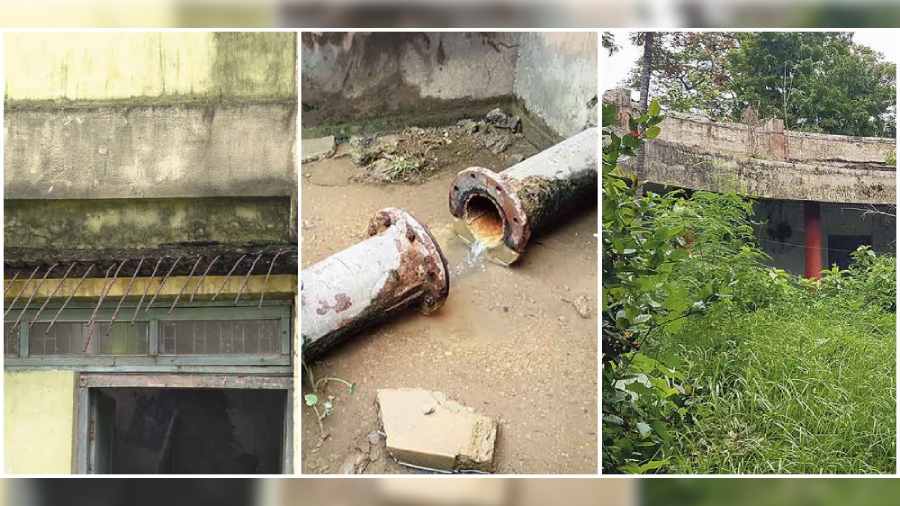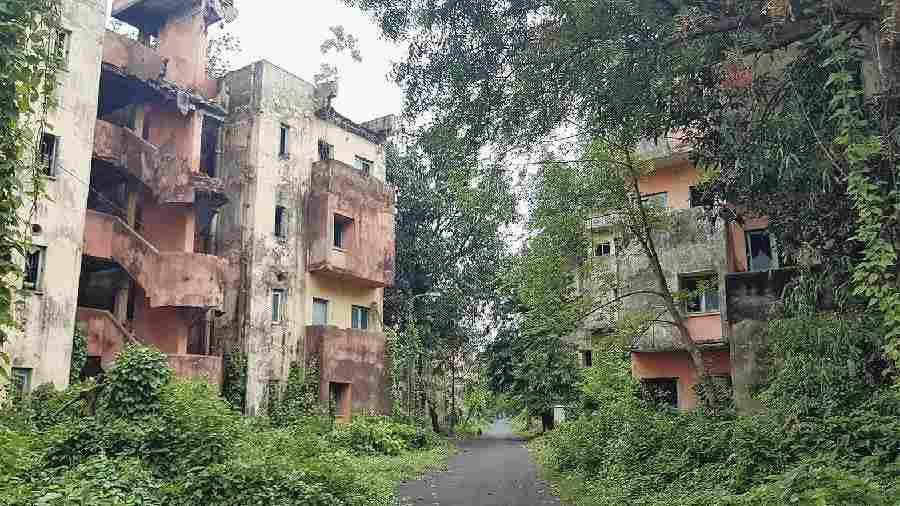Walking into the Post & Telegraph (P&T) Housing Complex in CC Block is like stepping into a time warp. An urban version of Mrinal Sen’s 1984 film Khandhar (Ruins) could be shot here. Nothing seems to have changed inside the sprawling housing complex since the turn of the millennium. Except that the wild grass has grown taller and the buildings have lost more cornices and developed more cracks.
Making one’s way through clearings that are often at risk of being overtaken by dense shrubs, one loses count of the number of buildings where the entire staircase has crumbled or where balconies have come crashing to the ground. One water tank has collapsed; the other will do so any day now.
Banyan trees grow out of terraces and their roots crack the walls. Streets are so dark that rickshaws refuse to enter after sundown. The condition of the buildings is so frightening that residents had to be evacuated before cyclone Amphan and put up at their community hall. The hall has been out of electricity for two years now, by the way.
It is difficult to believe that the complex is close to the posh and popular City Centre. And though the buildings look to be unfit for habitation, they still house employees of the postal department (the CC Block post office shares a boundary wall with the complex) and the Bharat Sanchar Nigam Limited (BSNL) and their families.

Badly damaged staircases of an apartment at the P&T housing complex

A collapsed first floor balcony at the housing complex
Background story
Construction of the quarters began in 1976, with the then Union minister of communications Shankar Dayal Sharma laying the foundation stone. Residents started moving in from 1982. “Back then, this was prime property and it was very difficult getting a flat here. We had to be in service for five to 10 years before we could even apply,” says a postal department employee in service for about 20 years now.
The complex does have the makings of a lovely neighbourhood. A sprawling campus comprising almost the entire CC Block, a park, lots of greenery, a community hall and administration office space…all undone by lack of maintenance.
Calcutta Telephones was given the land on lease by the state government. Gautam Bhattacharya, the immediate past chief general manager of the department of post, West Bengal circle, recalls: “The initial arrangement was such that since telecommunications had the greater share of the number of flats, the common area — roads, streetlights, stair lights, sewerage, water supply and grass cutting etc — maintenance was to be the responsibility of Calcutta Telephones. Once BSNL came into being, it was decided that if postal employees occupied all eight apartments of a block, the postal department would look after both external and internal maintenance. But if it had mixed occupation with more BSNL employees, then the external maintenance would be done by BSNL while the postal department would pay a share on pro rata basis. The internal maintenance of an apartment would be done by the respective employer. The arrangement exists on paper even today. But BSNL has been unable to keep up with maintenance due to their financial situation.”
Suman Chatterjee, deputy general manager of Calcutta Telephones, admitted to funds crunch being a major reason for the lack of maintenance. “Many of our staff quarters are in a shambles now, be they in Salt Lake or Ultadanga or Baishnabghata Patuli. Even our office buildings need more attention. We went into the red slowly after 2008. So we could not keep up with maintenance. Even now our vendor payments are not regularised. Even the corporate budget that is allotted comes under specific heads so we cannot divert funds from one head to another,” he said.
Another reason that lowers the priority of the job in the eyes of the authorities is the low occupancy of the complex.
Out of some 1,020 flats only 100 to 110 flats are occupied now. “One of the main reasons no one wants to live here is the lack of maintenance. Coming home is a life risk as chunks fall off the ceilings on a daily basis. Those of us still hanging around are here because of the location. There are schools and hospitals within walking distance and we have got used to the quiet Salt Lake life,” says another postal department employee.
House rent allowance (HRA), standard licence fee (maintenance charges) and water tax are deducted from salaries of employees who opt to live here. “Some of us are drawing nearly Rs 20,000 less in salary for this and look at the abhorring service we get. These buildings are life threats,” he adds. None of the residents agreed to go on quote to avoid official repercussion.
Bhattacharya explained that demand for government quarters was high earlier as the government’s HRA was too low to support rented private accommodation. “But the Sixth and Seventh Pay Commission raised the house rent allowance to a respectable sum. Now it is affordable to rent a house. House loans are also easy to get from banks so many prefer to use the HRA to pay monthly installments for flats they book. So people hardly apply for staff quarters any more. Had more people been staying the authorities would have been forced to sort out the maintenance situation.”
Chatterjee also pointed out that had income from house rent been sizeable, that sum could have been used for maintenance. “Hardly anyone asks for quarters these days. About 70 per cent flats are vacant in most complexes.”
Even around 2004-05, Bhattacharya recalls regular meetings that would be held between the department of post and BSNL, with staff quarter maintenance being on the agenda. They have long ceased to happen. “We did invite the director, postal services once but no one turned up for the meeting,” Chatterjee says.
Such explanations are hardly any consolation for the current boarders.
Staircase collapse
Chunks falling off buildings is so routine an affair at P&T that it does not elicit shock from residents anymore. With reasonable consistency they watch sunshades, balconies and even staircases come crashing down.
“A few years ago a family got stranded on their third-storey apartment when their staircase crumbled without warning,” says a BSNL employee. “They had to be pulled out by the fire brigade. Since the authorities showed no interest in repairing the stairs, they had to get professionals to fix ladders and bring down their belongings. Naturally, they have left P&T now.”
This man himself lives on the second floor a building and cannot go higher up as the staircase to the floors above has collapsed. “The tank on our terrace had some issues but the repairman couldn’t reach it,” he recalls.

(From left) A collapsed cornice has left rods inside exposed at the P&T staff quarters. (Sudeshna Banerjee); water leaking from pipes as the connecting valve has gone missing; the ground within the administration building is overgrown with weeds. Brinda Sarkar
There are countless tales of people taking shelter under buildings during the rains and having chunks land at their feet from the fourth floor.
Streets in the dark
Residents claim that six months ago workers from the state electricity board had cut off their street light connections as the bills were not paid for. Since then long stretches, such as the one between gates 3 and 5, are engulfed in pitch darkness after sunset.
The staircase lights in the buildings also do not work for three or four years now. “It’s risky for children, the sick or the aged to negotiate,” says a man who is paying for stair lights in his building out of his own pocket.
The community hall, as well as the residential association’s offices, have been in the dark since an electric fault during Durga puja in 2020. Thereafter no events can take place there and they have to take temporary connection from the electric board for pujas.
Windows of the community hall are broken and the ground within the office area is overgrown with trees. Meetings now have to be held outside the rooms to avail of light and ventilation.
Tank crash
Days before the lockdown of 2020, one of the two tanks at P&T collapsed. Luckily, no one came under the rubble, which have still not been cleared.
The tanks were of 33,000 gallons capacity each. The second tank still stands but perhaps not for long. It has rods exposed, concrete chunks missing and hanging so precariously that people keep away from it. “In fact, we have stopped using this tank. It can collapse any time during a thunderstorm,” says a resident.
Water at the P&T quarters is drawn solely from the underground, stored in an underground reservoir and sent directly to homes bypassing the non-functional overhead tank. “But it’s not enough. I have to buy Rs 4,500 worth of water a month, despite paying water tax to my employers,” says a woman employee of BSNL.
Despite the water shortage, residents show a missing valve in the system due to which water has been leaking out. “No one is bothered to replace it,” shows a resident.
The pump operators are languishing too. “There are six of us here and we haven’t been paid in nearly two years. The machines are in terrible shape and god alone knows how they are still running. There are two pumps in operation with another two supposedly on standby but these are fossils. If the need arises, these standby pumps won’t even switch on,” says an operator, who had refused to work on the now-collapsed tank after seeing its worn-out condition. “I could have lost my life otherwise,” he says.
Jungle safari
The campus has lots of greenery but residents say the department has not sent anyone to trim the grass once in the last 10 years. Banyan trees grow on rooftops, watered by the rains, and their roots are damaging the buildings.
“Water seeps into our flats every time it rains, sewerage systems are clogged and we have to wade through knee-deep waters during monsoon. The ground floor flats are overrun by snakes and insects and once a snake even reached a third floor flat,” says a postal department employee.
Despite it not being her purview, councillor Tulsi Sinha Roy has been getting their grass trimmed on special request. “Otherwise mosquitoes will breed here and infest the entire ward. Tulsidi has also repaired our roads as those whose job it is are least bothered,” he says.
Body dumped
The authorities have never provided security guards to this massive campus but concerns are mounting since the lanes are dark and grounds resemble jungles. “Outsiders come and drink here, couples pair up, slum dwellers steal grilles off our doors and windows…” says a resident who has lived here since the turn of the century.
He also narrates how an auto driver once dumped a body in the campus and fled. “He had run over a pedestrian somewhere and to avoid getting beaten up by the public, offered to ferry the injured man to the sub-divisional hospital. But on the way he got cold feet and so conveniently drove into our dark alleys, dumped the man and fled. We found the body the next day.”
About 15 or 16 years ago residents pooled in to hire private security guards for the campus. “We continued for five years but cannot afford it anymore. We are worried about our safety,” he says.
Deaf ears
The postal authorities say some repairs were carried out on humanitarian grounds during cyclone Amphan but there is no directive in place as yet from the top management as to the future of the complex.
The residents have left no stone unturned in a bid to improve their situation. “Complain korey amader mukh byatha hoye gyachhe. But there’s complete apathy from their end,” says an employee of BSNL. “They are non-committal, don’t take our calls or sometimes admit outright that they have no money or manpower for repairs. Then why do they charge us for living here? ” he wonders.
Chatterjee says the public service undertaking is trying to raise funds by monetising its assets. “Once the plan come through, we will try to do our best,” he promises.
Write to saltlake@abp.in
